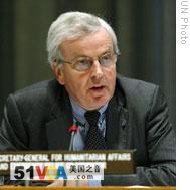United Nations
24 March 2009
 |
| John Holmes, Under-Secretary-General for Humanitarian Affairs and United Nations Emergency Relief Coordinator |
Humanitarian Affairs and Emergency Relief Coordinator John Holmes said U.N. and Sudanese government efforts to meet food, water, healthcare, shelter and sanitation needs of displaced persons in Darfur are significant, but they are not enough and are not sustainable.
"While a significant effort is being made by the government, by the U.N., by the NGOs which are left to plug some of the immediate gaps in these areas, these are at the same time band-aid solutions, if I can put it that way, not long term solutions," Holmes said.
He said the World Food Program has stepped in to provide food for two months to people in need.
But he cautioned that it is not feasible for WFP to do that indefinitely.
Holmes said aid operations in the Darfur region of Sudan are the biggest in the world and cost about $1 billion a year. He said such an operation requires expertise and capacities that cannot be easily replaced.
Earlier this month, a United Nations and Sudanese government joint assessment team spent nine days in North, South and West Darfur. They were evaluating the humanitarian situation in the aftermath of Sudanese President Omar al-Bashir's decision to expel the 13 largest aid groups from the country, following the International Criminal Court's decision to issue a warrant for his arrest. Mr. Bashir is charged with crimes against humanity for atrocities committed in Darfur.
The joint report warns that without fuel and spare parts for equipment, major water shortages could develop in Darfur within a few weeks. The report also says some 650,000 people are without full access to a range of health services after nearly 1,000 clinics were affected by the expulsions.
U.N. humanitarian and relief coordinator John Holmes says it is vital to have non-food items such as tarpaulins and cooking equipment distributed before the rainy season, which starts in May. He warned the rains could bring a new set of complications - including disease outbreaks from lack of sanitation and clean water.
Nearly five million people in Darfur rely on some form of international assistance.